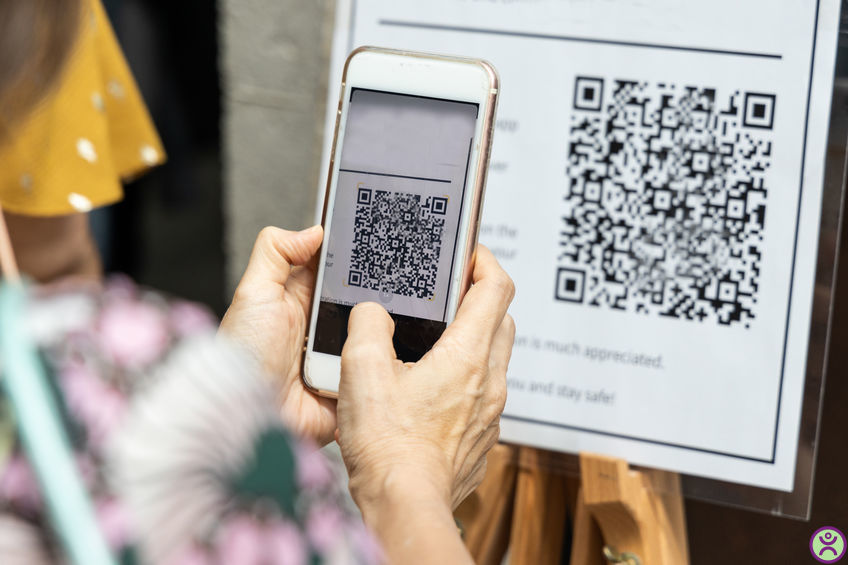You’ve probably scanned a QR code from your mobile phone’s camera at some point in your life, whether it was to check an online price, register a new product or check-in to an event. QR codes, or quick response codes, are 2D images that act like a barcode, automatically generating a website to bring up information or even a coupon or social media platform.
I scanned one recently that bought me to an online application I needed to fill out for a COVID test. It just makes it easier to get to an online location and reduces the chances of user error.
Recently, QR codes have been appearing on resumes, since they let you link to a location that has even more information than you can fit into a one to two-page resume. You can paste a QR code at the top of your resume and lead the recruiter or hiring manager to your online portfolio, your LinkedIn page, or a personalized YouTube video. QR codes are easy and free to create, you can find more info here: https://www.wikihow.com/Add-a-QR-Code-to-Your-Resume
So, should you use a QR code in your resume? Well, it depends. We asked hiring and career experts for their thoughts on whether QR codes are a cool tool for job seekers or just a distraction for recruiters who sift through thousands of resumes a day.
“While QR codes aren't necessarily a requirement for your resume and job candidacy, they can position job seekers as being tech savvy. It can also help more seasoned candidates combat ageism by showing they're innovative and on top of technology. Since it's not mainstream at the moment, it can spark interest from a hiring manager by helping your resume stand out from other resumes.
Think of the QR code as another marketing tool to display your relevant skills and experiences. You may want to link it to an online portfolio, a YouTube video or your LinkedIn profile. For instance, … if you're a graphics designer, you may want to link to a personal website with designs and client testimonials.”
Vicki Salemi, Monster Career Expert
“It can definitely add value to a typical resume, assuming you have a legitimate reason to use one. Say, if you’re developing something for a mobile device, a QR code is a super clever way of showcasing your skills. Say you’re making mobile websites, apps, etc. How cool is it to be able to have the person scan the QR code directly to be taken to your product?”
I think using them to link to a portfolio or a specific product you want to showcase would be really cool. Or otherwise, if you’re doing something super creative, like building a website or some sort of graphic that is created specifically for your resume, like a HIRE ME website or something silly like that. That would catch my attention.”
Nelson Sherwin, Manager of PEO Companies
“Candidates handing me their resume with a QR code always piques my interest and has a greater chance of getting hired. Once scanned with a smartphone, it may send you to the candidate’s online portfolio that contains more detailed information and samples of their work or to their social media profiles. In short, it makes a hiring manager’s life easier. For someone who has a lot of experience to share especially for designers and web developers, QR codes come in very handily. When used wisely, it will clearly set you apart from others.”
Israel Gaudette, Founder of Link Tracker Pro LinkTracker.Pro
“Only if they redirect recruiters to additional and substantial information about your skills, experience, or what you have to offer like in the form of your portfolio, video presentation, a blog, a Linked profile, or even a cover letter. QR codes should definitely not be there if they redirect to information that could easily be placed on resumes or a resume's digital duplicate. QR codes should be used on a paper version of a resume with a small caption explaining what the recruiter will be redirected to after scanning the code.”
Pete Sosnowski, VP of People and Co-Founder at Zety
“QR codes can help to differentiate you from the competition but only if used wisely. It makes sense to use them when they add value to your profile and evoke curiosity among the right audience. It might be a great idea to use a QR code as a creative factor when applying for a high-tech startup in Silicon Valley. However, I’d think twice before using it for more traditional industries where your creativity might add more frustration than value.”
Jessica Lim, HR Manager at LiveCareer
But what about the downsides of using a QR code in your resume? Some think it can backfire.
“If hiring managers are viewing your resume on their cell phone and don't have another phone to scan the QR code, then it may be futile. Even if they're viewing it on a laptop, they still may not scan it.”
Vicki Salemi, Monster Career Expert
“Using a QR code doesn’t add any value to a resume at all. It may let you look tech-savvy or cool, but it’ll never give an edge to having a better chance of getting hired. In my experience, I never hired someone just based on how techy or cool their resume is. Sometimes, it just made me have a second glance at the resume purely out of curiosity and never a deciding factor in hiring.”
Paul Lewis, Founder of Scrum Explainer
“Do it well and for the right reasons, in the right context, and you can be a winner right away. I’m going to remember the guy with the QR code. If you just do it and link to something boring or irrelevant, I will be resentful for the wasted time and your resume will go in the ‘No’ pile.”
Nelson Sherwin, Manager of PEO Companies Ready to put your resume to the test?














